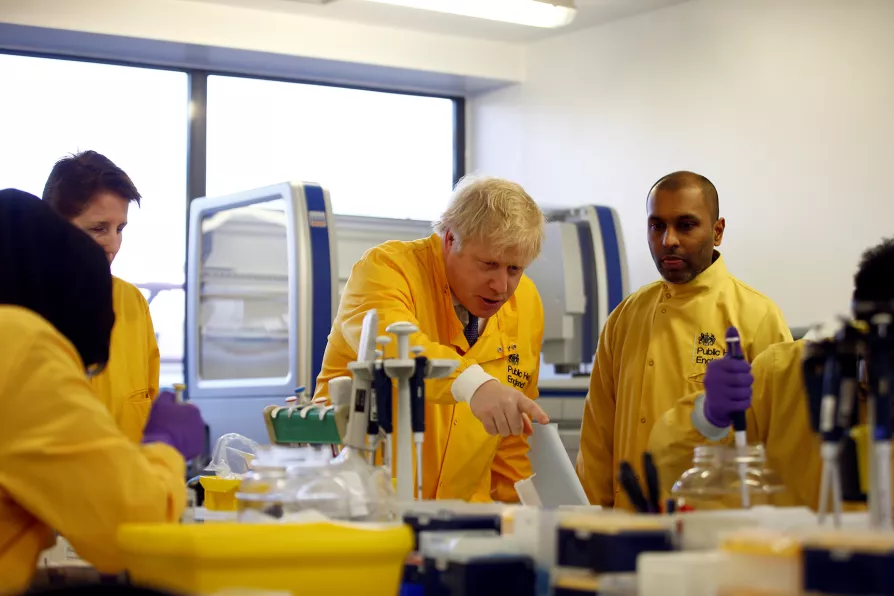
 Then-prime minister Boris Johnson visits a laboratory at the Public Health England National Infection Service in Colindale, north London, 2020
Then-prime minister Boris Johnson visits a laboratory at the Public Health England National Infection Service in Colindale, north London, 2020
BEREAVED families taking the government to court, for discharging untested NHS patients into care homes en masse in the early days of the Covid pandemic, are taking a stand for accountability.
The official Covid inquiry has so far proved more of an opportunity for guilty decision-makers to mislead the public than anything else. Opening sessions saw austerity architects David Cameron and George Osborne brazenly claim that their savage public-sector cuts had somehow helped prepare Britain to handle a pandemic.
Media attention focused on their disingenuous claims to have prepared for the “wrong” pandemic (a flu variant), rather than the reckless rundown of public investment that saw senior doctors warn of a “permanent winter crisis” in the NHS before the virus even struck. Nor was their health secretary — the current Chancellor, Jeremy Hunt — put through the wringer over similar claims, though he didn’t act on the findings of the government’s own Exercise Cygnus pandemic simulation that protective equipment stocks would quickly run out.
Matt Hancock — the health secretary who took the calamitous decision — is not likely to take any more responsibility.
He has not yet given evidence on decisions taken during the crisis, the focus of this autumn’s hearings. But in June he tried to blame everyone but himself — local authorities (themselves bludgeoned by years of Cameron-and-Osborne austerity), civil servants, even the World Health Organisation for Britain’s unprepared state.
In his memoirs, he places the blame on care home staff for spreading the virus — without coming clean on the reasons they did play a role, the endemic use of outsourced staff moving from care home to care home in a privatised and poorly regulated sector, and the lack of proper sick pay rights.
Like so many public inquiries, that on Covid will no doubt come to some stern conclusions — without prompting any political action.
We cannot lose sight of the fact that Britain’s death toll was extremely high, well at the upper end of countries globally. Many of the reasons why became obvious during the pandemic.
It was not just a decision like that of Hunt to allow PPE stocks to deteriorate without replacement — but a gutted manufacturing sector unable to produce things quickly in an emergency, forcing reliance on buying up foreign-produced PPE at a time when other countries were scrambling to do so too.
It was a workforce riddled with casualisation and insecure contracts, with statutory sick pay so low that even hopeless NHS Test & Trace supremo Dido Harding admitted people could not afford to isolate in accordance with the rules.
And it was a callous government that saw the mainly elderly victims of the virus as economically unproductive and therefore disposable.
Thanks to the vicious score-settling that soon consumed the Boris Johnson administration, we have that prime minister’s text messages dismissing an illness that mainly killed pensioners (“hardly anyone under 60 goes into hospital and of those virtually all survive… I no longer buy all this NHS overwhelmed stuff… There are max 3m in this country aged over 80.”)
Little of that is set to change. The current PM and Chancellor bear significant responsibility for pandemic deaths. Labour, whose current leader Keir Starmer claimed on election that “the last shall be first” with a new emphasis on respect and proper pay for key workers, has no plans to raise wages, supports further privatisation of healthcare and is watering down its promises to strengthen workers’ rights.
So the guilty must be put on the spot. A lawsuit exposing government responsibility for tragic and unnecessary care home deaths will help to expose the broken nature of our whole care home system — and make the case for serious reform.
In doing so, it can help put the Covid story back under the spotlight — and raise pressure on politicians to address the real reasons so many died.














